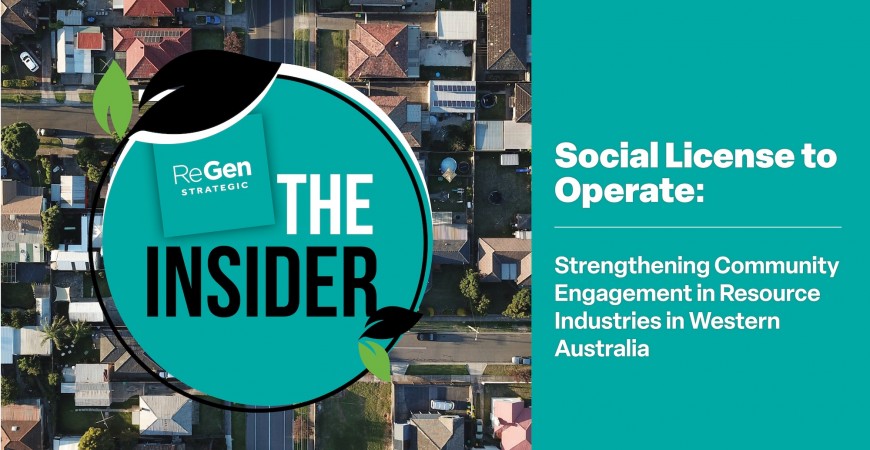In the resource industries, a company’s reputation can be just as valuable as its physical assets. While financial performance and operational efficiency remain essential to the long-term success of mining and energy companies, the increasingly complex and dynamic nature of stakeholder expectations is a significant factor in ensuring continued operations. One of the key elements that underpin this growing need is the concept of a social licence to operate.
A social licence to operate isn’t a formal legal requirement but a crucial intangible asset for companies, particularly in the mining sector.
In Western Australia, resource companies often operate in rural and remote communities which depend on mining for economic prosperity. But they also face challenges related to environmental, social, and cultural impacts.
For a mining project to be successful, it needs more than just government approval. It requires the trust and support of the local communities in which it operates to secure and maintain mining approvals and permits.
What is a Social Licence to Operate?
A Social Licence to Operate refers to the ongoing acceptance granted by a company’s local community and other key stakeholders. Unlike formal regulatory approvals, which are granted through governmental channels, a social licence to operate is not something that can be awarded through a piece of paper; it is built over time through trust, transparency, and multi-way dialogue. A company with a social licence to operate is seen as a responsible and ethical operator that meets or exceeds the expectations of not only regulators, but its community.
Regulatory Landscape and Community Engagement in WA
Western Australia’s mining and resource industries are governed by a comprehensive regulatory framework that emphasises environmental protection, social responsibility, and stakeholder engagement. Some of the critical regulations include the Environmental Protection Act 1986 (WA), the Mining Act 1978 (WA), and the Aboriginal Heritage Act 1972 (WA).
These regulations ensure that the environmental impacts of mining operations are mitigated, and that traditional landowners and Indigenous communities are consulted and protected. However, these legal requirements alone do not guarantee the community’s support or approval. This is where the concept of a social licence to operate becomes increasingly important.
The Role of Community Engagement in Securing and Maintaining a Social Licence to Operate
The process of obtaining and maintaining a social licence to operate involves a deep commitment to understanding and addressing the concerns and aspirations of local communities, especially those that may be directly impacted by mining operations.
In WA, companies are required to consult with affected communities and stakeholders as part of their environmental impact assessments (EIAs) under the Environmental Protection Act 1986. This legal obligation forms the baseline for engagement, but successful companies often go far beyond this. Some companies hold regular town hall meetings, conducting surveys, and setting up dedicated community liaison teams to foster ongoing communication. Others conduct social impact assessments to understand specific risks and opportunities and how to manage and mitigate them.
Effective community engagement is a proactive, ongoing process. Ideally it should begin early in the project lifecycle, ideally before formal applications for permits and approvals are submitted.
Building relationships with local communities helps to uncover concerns that may not be apparent during formal consultation processes. For instance, issues related to local infrastructure, cultural heritage, or water use might not be fully addressed by the environmental management plans required by regulators.
By engaging early, companies can better anticipate and address these concerns, thereby gaining greater community trust.
Transparency is a cornerstone of building trust with local communities. When mining companies communicate openly about their projects, operations, challenges, limitations and potential environmental and social risks and demonstrate how they plan to mitigate them, they show respect for the community’s concerns and will be more likely to gain community support.
In Western Australia, companies are required to publicly report on the outcomes of their environmental and social impact assessments. However, companies with a genuine commitment to their social licence to operate provide real-time updates on the progress of mitigation strategies, responding quickly to community concerns, and addressing grievances effectively.
Many WA mining operations take place on land that is home to Indigenous communities. These communities often hold significant cultural, spiritual, and historical connections to the land, and their voices must be heard and respected in any project. Under the Aboriginal Heritage Act 1972, companies must engage with Indigenous groups in a meaningful way to protect cultural heritage sites, secure their support and, ultimately, their social licence to operate. Beyond compliance, building relationships with Indigenous communities through programs that support education, employment, and community development can create a more robust and mutually beneficial relationship. These efforts not only enhance the company’s social licence but also contribute to positive outcomes for the broader community.
Securing and maintaining a social licence to operate in WA’s resource industries requires more than just meeting regulatory standards. Companies should invest in proactive, transparent, and sustainable community engagement that fosters trust, respect, and collaboration. By doing so, they should not only avoid delays to projects but also build strong, lasting relationships that contribute to the long-term success of their operations. As the resource sector continues to evolve, a genuine commitment to social responsibility is crucial in securing the future of mining and energy projects in WA.
 ReGen Strategic
ReGen Strategic